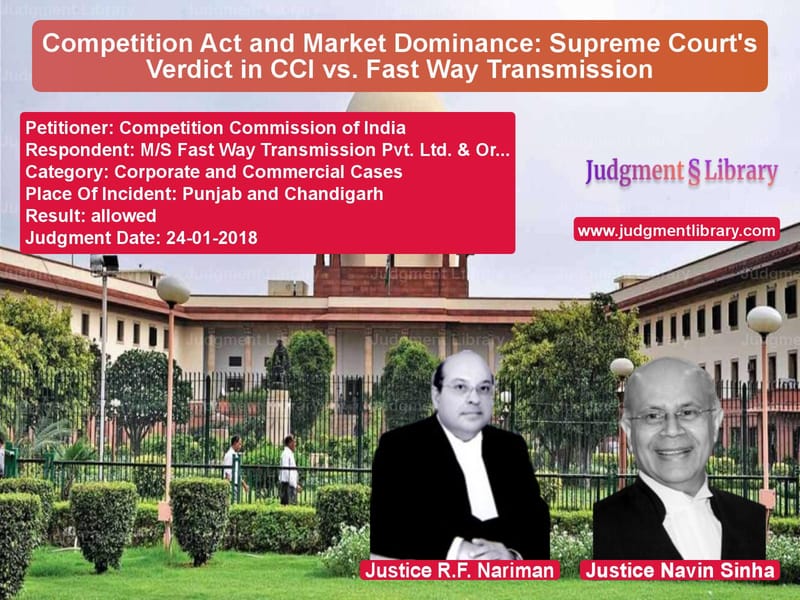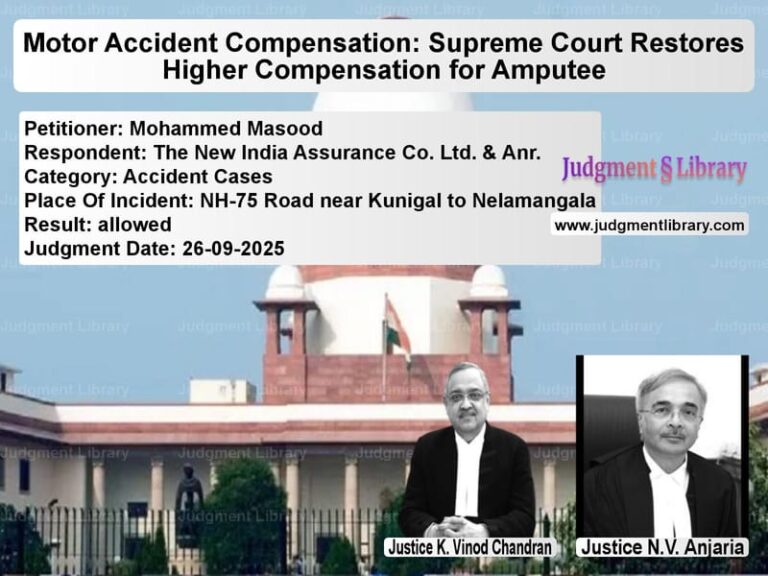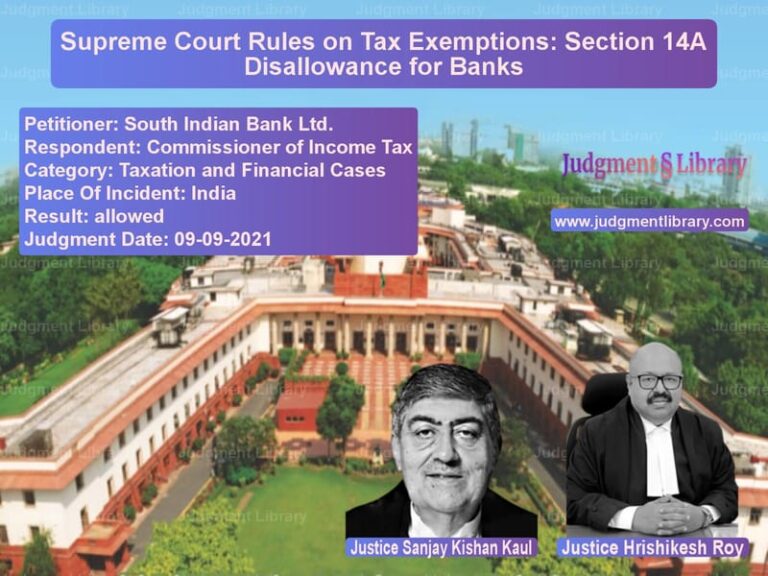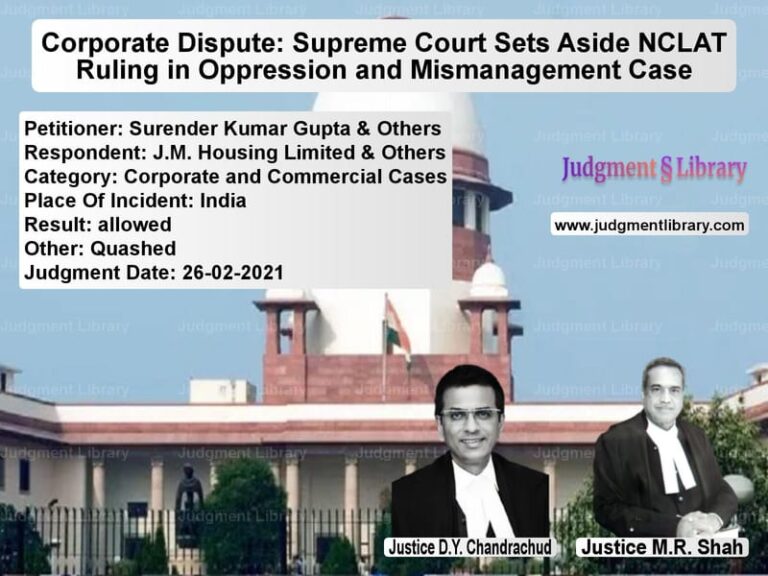Competition Act and Market Dominance: Supreme Court’s Verdict in CCI vs. Fast Way Transmission
The case between the Competition Commission of India (CCI) and M/S Fast Way Transmission Pvt. Ltd. is a crucial one in India’s competition law landscape. It revolves around the question of abuse of market dominance under the Competition Act, 2002. The case primarily concerns the unilateral termination of an agreement between a broadcaster and a group of Multi System Operators (MSOs), which led to allegations of unfair trade practices and denial of market access.
This case raises essential questions about the role of the Competition Commission in regulating market behavior and ensuring that dominant players do not misuse their market power. The Supreme Court’s ruling provides clarity on how competition law should be interpreted and applied, particularly in sectors where market dominance can lead to exclusionary practices.
Background of the Case
On August 1, 2010, an agreement was executed between a news broadcaster, ‘Day & Night News,’ and MSOs who were responsible for transmitting the channel to cable TV viewers. A related channel placement agreement was also signed the same day. These MSOs belonged to the Fast Way group, which had a dominant presence in the Punjab and Chandigarh region.
On January 19, 2011, the MSOs terminated the agreements with the broadcaster, citing a provision that allowed them to do so with 30 days’ notice. The broadcaster challenged this termination, alleging that it was unfair and driven by anti-competitive motives.
Investigation by the Competition Commission of India
Upon receiving the complaint, the Director General of Investigation examined the matter and submitted a report to the CCI. The report concluded that the MSOs had engaged in practices that violated Sections 3 and 4 of the Competition Act, 2002.
The CCI ruled that the relevant market in this case was the cable TV distribution market in Punjab and Chandigarh. It found that the Fast Way group held an 85% share of the subscriber base in this market, making it a dominant player.
Key Findings of the CCI
- “The argument of the OP group does not take away the fact that the informant is dependent on it for transmission of its channel, and if it is denied that, it cannot get access to the market.”
- “Due to its market power, the OP group has denied the opportunity for transmission of the channel of the informant.”
- “The conduct of OP has resulted in loss to the informant-broadcaster as well as denial of services to the consumers who want to watch the channel of the informant.”
Based on these findings, the CCI determined that the MSOs had abused their dominant position by denying market access to the broadcaster, in violation of Section 4(2)(c) of the Act. The Commission imposed a penalty of Rs. 8,40,01,141/- on the MSOs.
Appeal to the Appellate Tribunal
The MSOs challenged the CCI’s order before the Competition Appellate Tribunal, which ruled in their favor. The Tribunal held that denial of market access under Section 4(2)(c) could only be established if it was done by one competitor against another. Since a broadcaster is not in direct competition with an MSO, the Tribunal concluded that there was no violation of the Competition Act.
Supreme Court Proceedings
Unsatisfied with the Tribunal’s ruling, the Competition Commission of India appealed to the Supreme Court. The primary argument presented by the Additional Solicitor General, P.S. Narsimha, representing the CCI, was that the Tribunal had taken a narrow view of the law. He argued that the Competition Act was intended to promote market fairness and should be interpreted broadly to prevent anti-competitive behavior.
On the other hand, the respondents (MSOs) argued that their actions were justified based on technical constraints and the broadcaster’s poor TRP ratings. They contended that the termination of the agreement was based on business considerations rather than an abuse of dominance.
Supreme Court’s Verdict
The Supreme Court upheld the CCI’s finding that the MSOs were in a dominant position and had abused this dominance by denying market access. It ruled that the Competition Act should be interpreted in a manner that prevents monopolistic practices, even if the affected party is not a direct competitor.
Key Observations by the Supreme Court
- “Dominant position is clearly established when an entity enjoys a position of strength that allows it to operate independently of competitive forces in the market.”
- “The denial of market access in any manner is covered under Section 4(2)(c) and is not limited to competitors alone.”
- “The actions of the MSOs in this case resulted in the effective elimination of the broadcaster from the market.”
However, the Court also took into account the fact that the broadcaster’s TRP ratings were significantly lower than other channels, and its business failure was not solely due to the MSOs’ actions. Given these circumstances, the Court decided to set aside the penalty imposed by the CCI.
Conclusion
This ruling provides an essential clarification on how abuse of dominance is to be assessed under the Competition Act. The Supreme Court has reinforced the principle that dominant entities have a responsibility to ensure fair market practices and that market access cannot be denied arbitrarily. At the same time, the judgment also ensures that penalties are imposed judiciously, taking into account all relevant factors.
The case serves as a precedent for future disputes concerning market dominance and competition law, emphasizing the need for a balanced and fair approach in regulating market behavior.
Don’t miss out on the full details! Download the complete judgment in PDF format below and gain valuable insights instantly!
Download Judgment: Competition Commissi vs MS Fast Way Transmi Supreme Court of India Judgment Dated 24-01-2018.pdf
Direct Downlaod Judgment: Direct downlaod this Judgment
See all petitions in unfair trade practices
See all petitions in Corporate Compliance
See all petitions in Judgment by Rohinton Fali Nariman
See all petitions in Judgment by Navin Sinha
See all petitions in allowed
See all petitions in supreme court of India judgments January 2018
See all petitions in 2018 judgments
See all posts in Corporate and Commercial Cases Category
See all allowed petitions in Corporate and Commercial Cases Category
See all Dismissed petitions in Corporate and Commercial Cases Category
See all partially allowed petitions in Corporate and Commercial Cases Category







